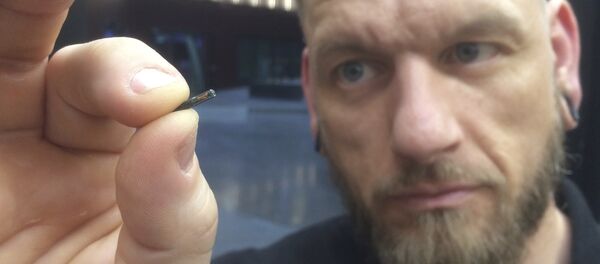The world is becoming increasingly digitized, and Swedes are pioneering the trend of using microchip implants for their own convenience. So far, about 3,000 Swedes have elected to graft microchips containing personal data.
Microchips can be used in a number of ways, including public transportation, as Sweden's national railway operator SJ became the world's first carrier to offer its customers this innovation.
SJ business manager Christoffer Löfquist himself has joined the Nordic nation's growing horde of "cyborg" passengers after having a chip installed between his fingers, a handy way of always having his ticket along. The chip is barely visible in the area between the thumb and the index finger and is read by special devices using radiowaves.
SJ börjar med chip under huden – SL vill ta efterhttps://t.co/L9aGX0FRVK #svpol #migpol #chip #aktuellt #RFID #opinionlive #svtagenda pic.twitter.com/EiTFTl7CS2
— Nivo (@Nivodius) May 19, 2017
"There are thousands who have registered to use the chip ticket, and there are about 200 people who use the chip ticket regularly," Christoffer Löfquist told Danish Radio.
"Why should not you? The technology is available and our customers will like it. So we think it's fun to try it out. Also, it is much easier than producing one's mobile phone. It's another level of convenience, Christoffer Löfquist said.
So far, the chips do not have GPS, and can only deliver the information they contain. However, many critics believe that a more wide-spread use of the technology will lead to more surveillance, infringing on personal liberties. Löfquist, however, is unperturbed about this.
"I'm not worried about that. The chip is dead anyway. There are no batteries in it. It does nothing as long as no scanner is applied," Löfquist ensured.
READ ALSO: Special Delivery: Norway to Try Transport Hyperloop for Salmon
Likewise, the SJ official is unruffled by hacking threats, which he doesn't even consider a considerable risk.
"That's fine by me. Anyway, it is the same as with a credit card. You can also hack it," Löfquist said.
After a year's trial run, SJ will decide whether it will continue with ticket implants.
Rusning efter tågresor i jul https://t.co/8lMYAuoYB4 pic.twitter.com/jx4rTcQk2k
— SJ AB (@SJ_AB) November 10, 2017
In neighboring Denmark, however, the new microchip craze has not reached the same scope, despite the enthusiasm of tech aficionados.
"I got one grafted into my hand because I've always been fascinated by technology and the idea of cyborgs, as a sort of fusion of man and machine," technology journalist Anders Høeg Nissen explained.
READ ALSO: Finland Covets Advantageous Railway to Arctic Russia





